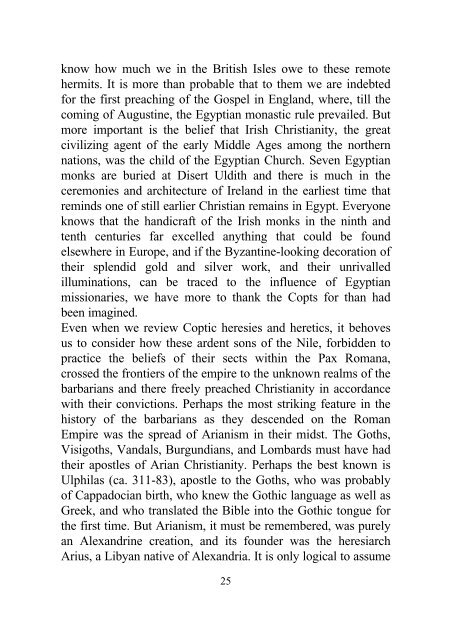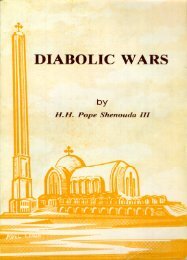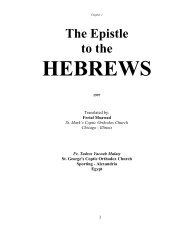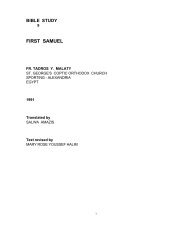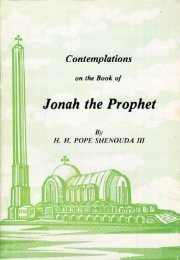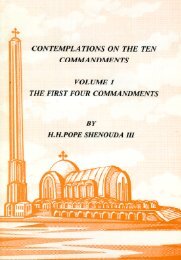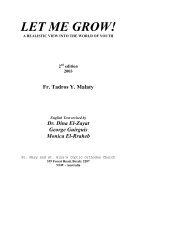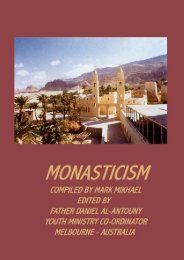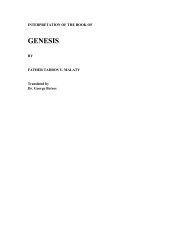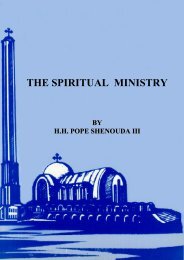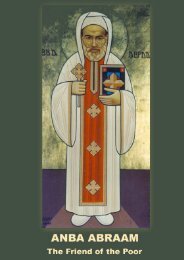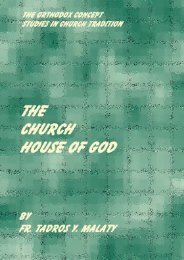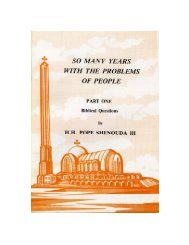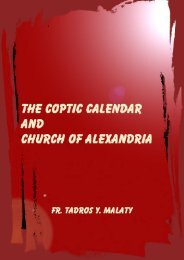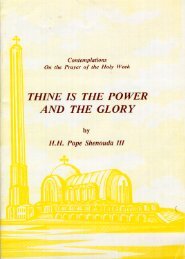the coptic contribution to christian civilisation - Fatherjacob.org
the coptic contribution to christian civilisation - Fatherjacob.org
the coptic contribution to christian civilisation - Fatherjacob.org
Create successful ePaper yourself
Turn your PDF publications into a flip-book with our unique Google optimized e-Paper software.
know how much we in <strong>the</strong> British Isles owe <strong>to</strong> <strong>the</strong>se remotehermits. It is more than probable that <strong>to</strong> <strong>the</strong>m we are indebtedfor <strong>the</strong> first preaching of <strong>the</strong> Gospel in England, where, till <strong>the</strong>coming of Augustine, <strong>the</strong> Egyptian monastic rule prevailed. Butmore important is <strong>the</strong> belief that Irish Christianity, <strong>the</strong> greatcivilizing agent of <strong>the</strong> early Middle Ages among <strong>the</strong> nor<strong>the</strong>rnnations, was <strong>the</strong> child of <strong>the</strong> Egyptian Church. Seven Egyptianmonks are buried at Disert Uldith and <strong>the</strong>re is much in <strong>the</strong>ceremonies and architecture of Ireland in <strong>the</strong> earliest time thatreminds one of still earlier Christian remains in Egypt. Everyoneknows that <strong>the</strong> handicraft of <strong>the</strong> Irish monks in <strong>the</strong> ninth andtenth centuries far excelled anything that could be foundelsewhere in Europe, and if <strong>the</strong> Byzantine-looking decoration of<strong>the</strong>ir splendid gold and silver work, and <strong>the</strong>ir unrivalledilluminations, can be traced <strong>to</strong> <strong>the</strong> influence of Egyptianmissionaries, we have more <strong>to</strong> thank <strong>the</strong> Copts for than hadbeen imagined.Even when we review Coptic heresies and heretics, it behovesus <strong>to</strong> consider how <strong>the</strong>se ardent sons of <strong>the</strong> Nile, forbidden <strong>to</strong>practice <strong>the</strong> beliefs of <strong>the</strong>ir sects within <strong>the</strong> Pax Romana,crossed <strong>the</strong> frontiers of <strong>the</strong> empire <strong>to</strong> <strong>the</strong> unknown realms of <strong>the</strong>barbarians and <strong>the</strong>re freely preached Christianity in accordancewith <strong>the</strong>ir convictions. Perhaps <strong>the</strong> most striking feature in <strong>the</strong>his<strong>to</strong>ry of <strong>the</strong> barbarians as <strong>the</strong>y descended on <strong>the</strong> RomanEmpire was <strong>the</strong> spread of Arianism in <strong>the</strong>ir midst. The Goths,Visigoths, Vandals, Burgundians, and Lombards must have had<strong>the</strong>ir apostles of Arian Christianity. Perhaps <strong>the</strong> best known isUlphilas (ca. 311-83), apostle <strong>to</strong> <strong>the</strong> Goths, who was probablyof Cappadocian birth, who knew <strong>the</strong> Gothic language as well asGreek, and who translated <strong>the</strong> Bible in<strong>to</strong> <strong>the</strong> Gothic <strong>to</strong>ngue for<strong>the</strong> first time. But Arianism, it must be remembered, was purelyan Alexandrine creation, and its founder was <strong>the</strong> heresiarchArius, a Libyan native of Alexandria. It is only logical <strong>to</strong> assume25


